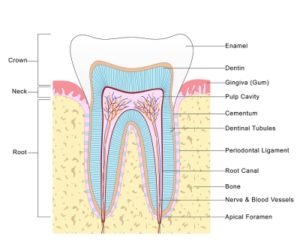BUSTING COMMON MYTHS ABOUT ROOT CANALS
Root canals have been unfairly held in unfavorable repute. Each year, this procedure saves countless teeth from extraction, which can demand more extensive treatment such as dental implants or dentures. Yet with one root canal in Belmont, a tooth can continue to do its job of aiding in eating and speaking for many years. Understanding the truth behind how root canals work and why they are so important to dental health can make your own root canal procedure a smoother process.
A Root Canal Is an Uncomfortable Procedure
One of the most prevalent misconceptions about root canals is how painful they can be. On the contrary, a root canal typically causes no discomfort at all. Your dentist has at his disposal many comfort aids, including sedation dentistry services, to ensure that you feel completely at ease during the entirety of your treatment. Before your procedure begins, your dentist can confirm that you sense no pain or anxiety before moving forward with your root canal.
A Filling Can Suffice for a Root Canal
Some people might assume that a filling can address tooth decay just as capable as a root canal. However, fillings only work when fixing minor cavities that have not yet reached the interior of the tooth. Once bacteria breach the center of the tooth where nerves and blood vessels reside, they begin to damage and degrade these structures. A filling can restore lost tooth enamel, but it cannot fix the infection that a deep cavity may cause.
A Root Canal Can Worsen a Tooth Infection
To alleviate a tooth infection, your dentist must remove the tissue fostering its growth. During a root canal, your dentist penetrates the tooth interior with small files that can bring up the infected tissues as well as bacteria. The introduction of antibiotics can further eliminate any remaining germs that may be hidden deep in the canals of your tooth. With a root canal, your dentist can stop a tooth infection. To let an infection go unchecked is to risk a buildup of pressure and bacteria that could damage nearby tissue and bone and require a tooth extraction.



